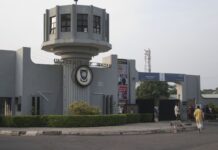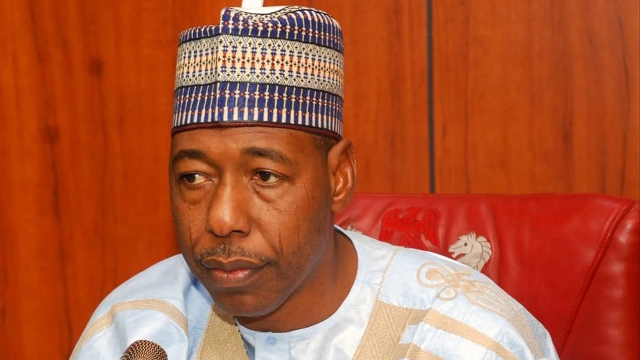The governor of Borno State yesterday called on the federal government to use mercenaries to defeat the Boko Haram insurgents.
The governor stated this when he received a delegation of the federal government that was in Maiduguri to sympathise with him on last weekend’s killing of 43 farmers in Zabarmari, Jere local government area of the state by the Boko Haram insurgents.
Besides hiring mercenaries, the governor made five other recommendations to end the war.
“One of our recommendations as possible solutions to end the insurgency is the immediate recruitment of our youths into military and paramilitary services to complement the efforts of the Nigerian forces.
“Our second recommendation is to engage the services of our immediate neighbours, especially the government of Chad, Cameroon and Niger Republic, in clearing the remnants of Boko Haram hiding in the shores of the Lake Chad.
“Our third recommendation is for him to engage the services of the mercenaries to clear the entire Sambisa forest.
“Our fourth recommendation is for him to provide the police and the military, with armed resistant armoured personnel carriers and other related equipment.
“We are also soliciting the support of the federal government to support the Borno State repatriation of out displaced persons currently residing in Cameroon and Niger Republic,” he said.
The governor also called on President Muhammadu Buhari to increase federal support for residents of Borno State.
The governor said though the insurgency had dragged on for 11 years, it was persistent because efforts had not been well coordinated.
The governor said one of the major reasons the insurgency persisted was due to a lack of critical infrastructure like good roads in the region.
He said the federal ministry of works had not constructed or rehabilitated roads in the last 25 years “in Borno State and most parts of the northeast.”
Meanwhile, the presidency said yesterday that the slain farmers did not get military clearance before going to the farms.
Presidential spokesman, Mr. Garba Shehu who stated this in an interview with the BBC, said he was not blaming the victims for the incident, but that the truth must be told.
“The government is sad that this tragic incident has happened. Forty-three or thereabout of innocent farm workers, most of them had their throats slit by a heartless band of terrorists. People need to know what it is like in the Lake Chad Basin area.
“Much of those areas have been liberated from Boko Haram terrorists but there are a number of spaces that have not been cleared for the return of villagers who have been displaced. So, ideally, all of these places ought to pass the test of military clearances before farmers or settlers resume activities on those fields,” he stated.
When asked if he was not blaming the farmers for going to the area, Shehu said: “Not exactly, but the truth has to be said. Was there any clearance by the military which is in total control of those areas? Did anybody ask to resume activity? I have been told by the military leaders that they had not been so advised and certainly, therefore, it was a window that the terrorists exploited.”
However, Garba’s outburst attracted the ire of the public forcing him to offer some clarification on what he meant.
Taking to his twitter handle, Shehu wrote: “No one is delighted with the massacre in Zabarmari and there is nothing anybody will gain by playing blame games.
“The question I tried to answer on BBC was: did the security sign off on the area as being free of mines and terrorists? The honest answer is, no.
“I’m human with tons of compassion and empathy, and could not have said that the victims deserved their fate for ignoring security clearance.
“I was merely explaining the mode of military operations in the war zone of the North-east. There are areas that are still volatile that require security clearance which is intended to put people out of harm’s way.
“When tragedies occur, questions arise in terms of how something happened in order to avoid future recurrence. Informing the military of our movements in an area of volatility and uncertainty is intended to preserve public safety.
“Explaining why something happened doesn’t mean I have no sympathy for the victims. I was just explaining the military procedures on the safe movement of the people and not supporting the death of the victims.”
Meanwhile, the defence headquarters yesterday accused the Borno residents of frustrating the war against terror by providing information on troops’ movements and activities to Boko Haram.
Coordinator of defence media operations, Maj. Gen. John Enenche, who spoke on a television programme said information gathered from the attack showed that some of the insurgents were already cohabiting with the villagers before the attack.
Asked how the military had no prior intelligence on the attack, Enenche said the army needed information from locals to aid its operation.
“That has been our worry. It’s a concern for us. You need a guide, you need information. Will they tell us? That’s a question that we have to ask. Yes, sometimes. And most times, no. And that was one of the issues we have been ensuring to overcome, with civil-military cooperation activities, reaching out to them, even sending people by proxy to talk to them,” Enenche said.
He said since it is not possible to force information out of the people, the military has to be patient with them to gain their confidence.
The army spokesman also debunked a UN report that 110 civilians died in the attack.
He said the field commandants gave him a synopsis of what happened.
“When the governor was to go and after they had recovered the dead, the troops had to move in there and they counted 43.
“Probably we may count up to the figure he (Kallon) gave in the future but as it is now, what we have counted with the locals is still 43 and we are hoping that we don’t get beyond that,” he said.
Enenche also lamented that COVID-19 was affecting the production and delivery of equipment, including unmanned aerial vehicles (UAV) that are vital for military surveillance operations in the northeast.
He said some equipment had not been delivered by original engine manufacturers because of the pandemic, which disrupted activities globally.






















































